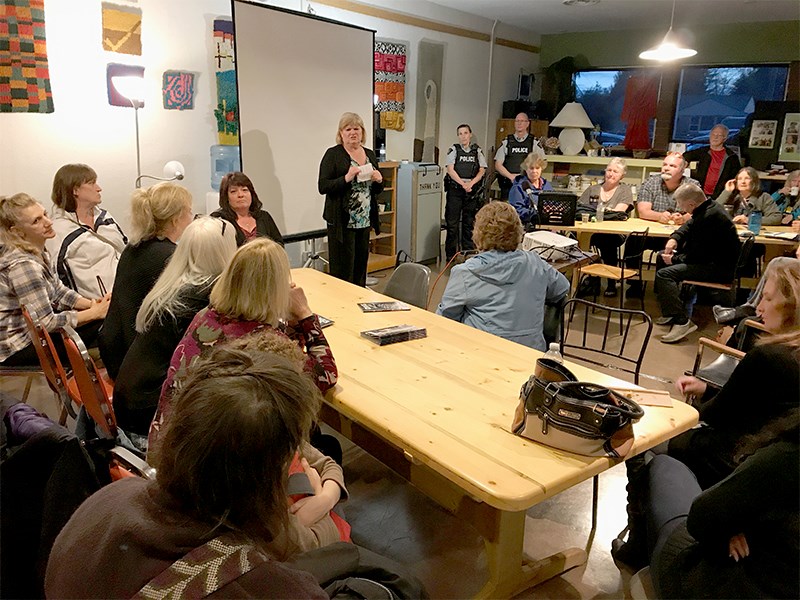More than 85 Powell River residents, some of them mothers who lost their children to drug overdoses, gathered at the Community Resource Centre to find out more information on the local battle against BC’s opioid crisis.
A community forum held Thursday, May 11, included presentations from Vancouver Coastal Health (VCH) medical health officer Paul Martiquet, Powell River Mental Health and Addictions representatives and emergency first responders.
City of Powell River councillor Maggie Hathaway hosted the evening.
“It was a good starting point and we have a lot of work to do,” said Hathaway. “This is a social issue that we need to face. We can’t bury our heads.”
Martiquet began the evening by providing the framework for understanding the crisis. It was a just over a year ago that BC saw its highest monthly total of overdose deaths in a decade and provincial health officer Perry Kendall declared a public health emergency.
It is well known that 2016 was a record year for overdose deaths in the province, with close to 1,000 individuals dying. Six of those deaths occurred in Powell River, Martiquet told the audience.
“The numbers are horrific and we’re not making huge inroads,” he said. “We’re not doing enough. We have not been able to reduce the numbers.”
This year is already shaping up to surpass 2016 numbers, added Martiquet.
It’s not just fentanyl that is to blame, so it is inaccurate to call this a fentanyl crisis, he said.
“The six deaths that occurred were the result of opioids; not all fentanyl, some carfentanil,” said Martiquet.
Carfentanil is also a synthetic opioid painkiller, chemically similar to fentanyl, but about 10,000 times more potent than morphine. Fentanyl, by comparison, is between 50 to 100 times stronger than morphine.
Martiquet said a Powell River RCMP drug seizure of fake oxycodone pills revealed the pills to contain “a whole mishmash of opioid analogues, not just fentanyl.”
“We know the drugs are contaminated and they are here in Powell River,” he said.
Darlana Treloar lost her son Sean to a fentanyl overdose last May. She said that drug addition can happen to anyone.
“It does not discriminate and it can happen to any family; rich or poor,” Treloar told the audience. “One lapse in judgement can change the course of an entire life.”
Treloar said despite the fact that Powell River is a small, isolated city, it is not “behind the times where drugs are concerned.”
Martiquet said an important message for the community is that overdose deaths are often caused by users not taking basic precautions.
“My take-home message is this: don’t use alone and decrease your dose because you do not know what is in the drugs you are taking,” he said.
According to Hathaway, Powell River needs to lobby the BC government to allocate more funds for battling drug overdoses in the community.
“We need to fully pull in the provincial government for more treatment options here,” said Hathaway.
Martiquet added that naloxone, an injectable drug used to reverse an overdose, is not a magic pill to solve the crisis and does not get to the root of the drug problem.
“These people who are overdosing are damaged people who have been subjected to trauma throughout their lives,” said Martiquet, “usually in childhood.”
Roughly 80 per cent of the individuals dying due to overdose are males between the ages of 30 and 50, said Martiquet.
“This is not a young man’s disease,” he said. “The people dying were experienced users.”



